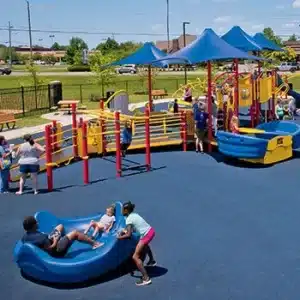3 Steps For Designing A Protected Play Surface In San Diego

3 Steps For Designing A Protected Play Surface In San Diego
Kids need room to grow and explore, gaining confidence along the way. Much of this growth happens during playtime, making playgrounds vital for fun and self-discovery. Artificial grass is designed in such a way to prevent injuries.
Playground safety is crucial whether you’re a parent or caretaker. You want kids to be daring, climb high, and take chances, but safely.
If you’re establishing a new playground in your building or working on any school project with turf or improving an existing one, there are numerous things to keep in mind to prevent injuries. (Want to know how artificial grass improves playground safety? We’ll explain why synthetic turf is safe, too!)
Choose A Reliable Playground Surface
The playground surface helps protect kids from crucial fall heights. Wood chips are inexpensive and quick to instal, but they require a lot of maintenance to keep a play area safe. Loose-fill surfacing changes readily, and in highly trafficked areas, there isn’t enough product to cushion unavoidable falls. Trash and dangerous material can also combine with loose-fill. Artificial grass, a shock cushion, and Envirofill or Safeshell infill are safe and low-maintenance alternatives. Our durable materials and Envirofill’s 16-year warranty provide a lot of protection with minimal surface maintenance.
If you don’t choose artificial turf or pour-in-place surfacing, add in maintenance fees and time for upkeep to ensure your playground’s loose-fill offers appropriate overall safety and protection from critical fall heights.
Determine Which Age Group Will Use The Playground
Different age groups need different-sized equipment, thus a preschool playground will appear different than a public park playground meant for all ages.
If only tiny children will use your playground, choose smaller equipment like swing sets. If it’s a mixed-age playground or a home playground your kids will use as they grow, choose height-adjustable swings or different-sized equipment.
Measure All Equipment Exactly
Protecting kids from fall heights requires precision. You’ll need to measure your playground’s highest point to calculate the crucial fall height and ensure it’s appropriately padded, which varies by surface. Over-30-inch equipment should be 9 feet apart, and ramps and staircases should have guardrails.
FAQs
What Qualities Should Artificial Grass Have?
It is important to keep in mind that the quality of artificial grass will vary widely depending on the manufacturer, type, and price. When choosing artificial grass for your home or business, you should look for certain qualities to ensure you are getting high-quality turf that will last a long time. One of the main qualities to consider is how realistic the grass looks. Artificial turf should be designed to look and feel as close to natural grass as possible, while being easy to maintain. It should have a lush green color and it should not have any visible seams or edges when properly installed. The blades of artificial grass should also be textured in order to replicate the look of real grass for your home decoration.
Do Fire Or Earthquake Able To Harm Synthetic Grass?
It is important to consider the effect of natural disasters such as fire and earthquakes on synthetic grass. Fire can cause significant damage to both the base material and fibre itself, while an earthquake can separate the individual strands or create gaps between them. The two main components that make up synthetic grass are a latex backing and fibres. The latex backing consists of numerous materials that contribute to its durability, including rubber granules. In the event of a fire, the latex backing is likely to melt and become brittle. This can result in discolouration or holes in the synthetic grass due to heat damage. The fibres themselves will also be susceptible to heat-related damage, with some types of fibre capable of melting and sticking together or becoming discoloured.
What Happens If The Artificial Grass Is Placed On Soil?
It is important to know what happens if you place artificial grass on soil. If the grass is placed directly onto soil and there is not sufficient drainage, the water will not evaporate quickly enough and can cause the artificial grass blades to become sodden or compressed. This could lead to an uneven surface, a musty smell, or even algae growth in the synthetic turf. As a result, it is not recommended to place artificial grass directly onto soil as this can significantly reduce its lifespan and performance quality. To ensure that your artificial grass lawn remains in top condition for years to come, it should be placed on a properly prepared surface with adequate drainage. This could be a gravel-based or concrete sub-base or even a specially-designed artificial grass underlay. There are many advantages to using an artificial grass underlay, such as increased drainage capabilities, improved resistance to wear and tear, added cushioning for extra comfort, and reduced maintenance costs in the long run.
Call Playground Safety Surfacing at (888) 902-3777 for more information. We have put a lot of effort into becoming the top supplier.
Conclusion
Get in touch with Playground Safety Surfacing at (888) 902-3777. We have worked hard to establish ourselves as the best supplier of playground surfaces and more.
Let's Get In Tough
How can we help you?
Our Services
Related Posts

A Comprehensive Guide to Installing Artificial Grass on Sports Fields In San Diego
A Comprehensive Guide to Installing Artificial Grass on Sports Fields In San Diego Installing artificial grass…

The Ultimate Guide to Installing Artificial Grass on Rooftops In San Diego
The Ultimate Guide to Installing Artificial Grass on Rooftops In San Diego Want to transform…


Leave a Reply